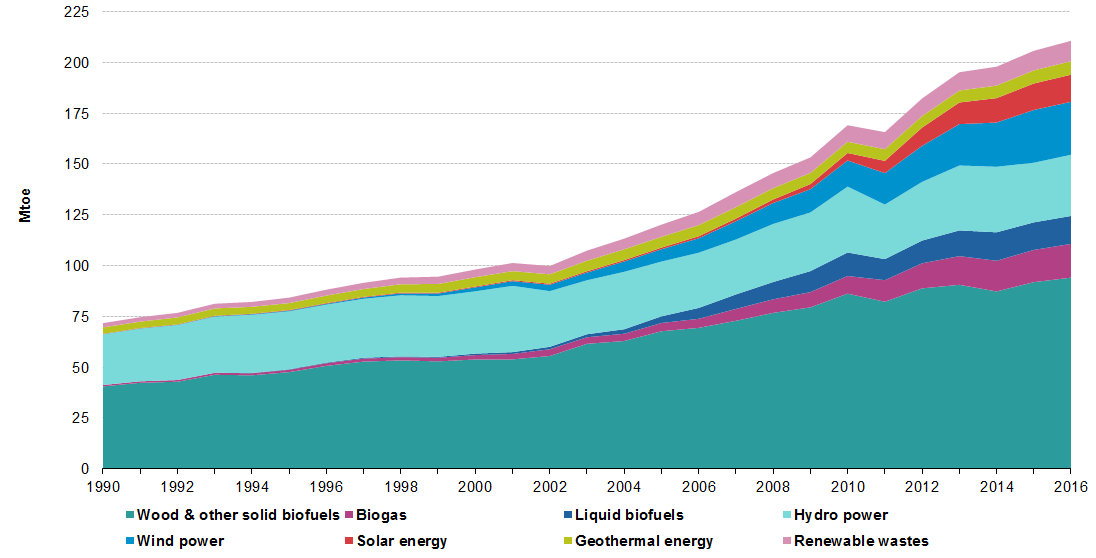Renewable energy is energy generated from non-fossil based energy sources which are replenished in a human lifetime. Renewable energy sources include solar and wind energy, marine energy and hydropower, geothermal energy and bioenergy. Using more renewable energy is crucial if the EU is to reduce its GHC in order to comply with the 2015 Paris Agreement on Climate Change. Increasing the use of renewable energy could also reduce the EU’s dependence on fossil fuels and imported energy, thus contributing to the security of its energy supply.
In 2015, 26.7 % of the primary energy produced across the EU came from renewable sources. The production of renewable energy grew from around 120 Mtoe in 2005 to 205 Mtoe in 2015 (an increase of 71 %), whereas the production of primary energy from most of the other sources declined in the same period, both in absolute and relative terms.

Biomass is by far the most significant renewable energy source in the EU: it accounts for 63.3 % of all renewable energy production. This makes the agriculture and forestry sectors particularly important to
renewable energy production. In 2010, 48.5 % (80.7 Mtoe) of the renewable energy produced across the EU came from forestry biomass, while agricultural biomass accounted for a further 10.6 % (17.6 Mtoe). Whilst renewable energy represents 26.7 % of the energy produced in the EU, according to the Commission’s Renewable Energy Progress Report from 2017, the share of renewable energy in the EU in terms of consumption had reached only 16 % in 2014. This is because more than half of the EU’s energy consumption was supplied by net imports.
To boost the production of renewable energy and to reach their national renewable energy targets, the Member States have implemented a variety of policy measures. They include financial incentives, such as feed-in tariffs (FITs) or feed-in premiums (FIPs); and measures, such as quota obligations with tradable green certificates. Combinations of these instruments are often used, particularly in the electricity sector. In the heating and cooling sector, support is mainly based on investment grants and tax incentives. Renewable energy is a cross-cutting priority relevant to many EU policy areas. The EU provides support for renewable energy under several funding programmes. These include the European Regional Development Fund (ERDF) and the European Agricultural Fund for Rural Development (EAFRD) as well as the Horizon 2020 and LIFE programmes.
Primary production of energy from renewable sources EU-28 1990-2016 (Eurostat, 2018)

Source: Renewable energy for sustainable rural development: significant potential synergies, but mostly unrealised. (2018), Access on: https://www.eca.europa.eu/Lists/ECADocuments/SR18_05/SR_Renewable_Energy_EN.pdf
